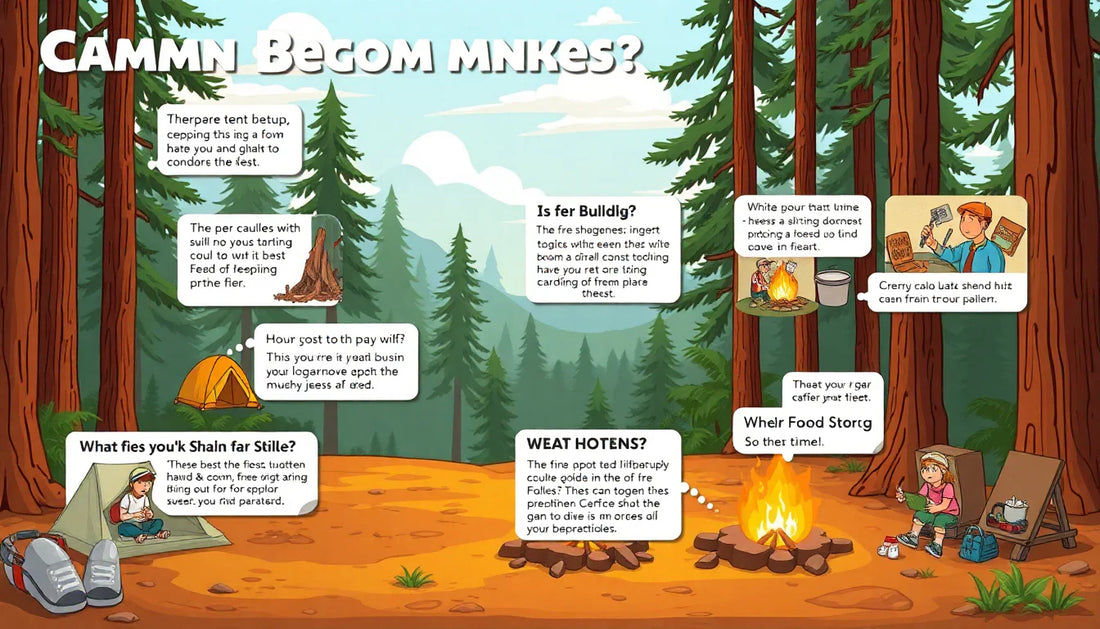
Camping Mistakes Beginners Often Make (and How to Avoid Them)
Share
Embarking on your first camping adventure can be an exhilarating experience, but it's also a time when new campers are prone to making mistakes. These missteps, while common, can quickly turn a peaceful getaway into a stressful ordeal. As the team at GlowCamp, we've seen it all - from forgotten gear to improper campsite selection. That's why we're here to share our insights and help you avoid the most common camping pitfalls.
Gear and Preparation Mistakes
One of the most frequent errors new campers make is underestimating the importance of proper gear and preparation. Investing in quality, functional equipment is crucial for a comfortable and safe camping experience. Skimping on essentials like a reliable tent, sleeping bag, or camp stove can lead to a miserable time in the great outdoors.
Another common mistake is forgetting to pack essential items. It's easy to get caught up in the excitement of planning your trip and overlook the small but vital things, like a first-aid kit, headlamps, or extra batteries. Taking the time to create a comprehensive packing list and double-checking it before departure can save you from a lot of headaches.
Proper packing strategies are also key. Haphazardly throwing gear into your backpack or car can result in a disorganized and inefficient setup once you reach your campsite. Investing in quality storage solutions, like dry bags and packing cubes, can help you stay organized and ensure you can easily access what you need.
Campsite Selection Errors
Choosing the right campsite is crucial for a comfortable and safe camping experience. Many beginners make the mistake of selecting a location without considering factors like terrain, weather conditions, and potential hazards. Pitching your tent in a low-lying area prone to flooding or on a slope can quickly turn your dream getaway into a nightmare.
It's also important to familiarize yourself with the specific rules and regulations of the camping area you've chosen. Some parks or wilderness areas may have restrictions on where you can set up camp, and ignoring these guidelines can lead to issues with park rangers or other authorities.
Proper tent setup is another area where new campers often struggle. Failing to properly stake down your tent or not taking the time to level the ground can result in a wobbly, uncomfortable, or even unsafe shelter. Taking the time to learn and practice tent-pitching techniques before your trip can make a significant difference in your overall camping experience.
Safety and Survival Oversights
Camping, by its very nature, involves exposure to the elements and potential risks. Underestimating environmental hazards is a common mistake among beginners. From unexpected weather changes to wildlife encounters, being unprepared for these situations can quickly turn a fun adventure into a dangerous one.
Equally important is having a solid understanding of emergency preparedness and first-aid. Knowing how to respond to injuries, illnesses, or other emergencies can be the difference between a minor inconvenience and a life-threatening situation. Investing in a comprehensive first-aid kit and learning basic survival skills can give you the confidence and peace of mind to enjoy your time in the great outdoors.
Practical Camping Skills Gaps
Mastering the practical skills required for camping can take time and practice. Novice campers often struggle with tasks like starting a fire, managing food and water supplies, and navigating unfamiliar terrain. Failing to develop these essential skills can lead to frustration, discomfort, and potentially dangerous situations.
Taking the time to learn and practice fire-starting techniques, proper food storage and preparation, and basic navigation skills can greatly enhance your camping experience. Consider taking a beginner's camping course or seeking guidance from experienced campers to help you develop these practical abilities.
Budget and Planning Pitfalls
Camping can be an affordable way to enjoy the outdoors, but it's easy for beginners to overspend on unnecessary gear or make poor planning decisions. Impulse buying expensive equipment or failing to research and plan your trip thoroughly can quickly eat into your budget and lead to disappointment.
It's important to strike a balance between investing in quality gear and staying within your means. Take the time to research and prioritize the essential items you'll need, and be mindful of your spending. Additionally, thorough trip planning, including researching campsite availability, transportation, and potential activities, can help you set realistic expectations and avoid unpleasant surprises.
Conclusion
Camping is an incredibly rewarding and enriching experience, but it's not without its challenges, especially for beginners. By being aware of the most common mistakes and taking steps to avoid them, you can ensure that your first (or next) camping adventure is a resounding success.
Remember, the key to a great camping trip is preparation, knowledge, and a willingness to learn. Don't be afraid to seek guidance from experienced campers, read up on best practices, and take the time to develop the necessary skills. With the right mindset and a little bit of practice, you'll be well on your way to becoming a confident and capable camper.
So, pack your gear, choose your campsite, and get ready to create unforgettable memories in the great outdoors. Happy camping!
